Death, taxes, some form of end-of-season carnage in League One. The three certainties of life on planet Earth. At this point last season, it was the relegation battle encompassing 50% of the division that was causing palpitations across the third tier on a weekly basis. This season the logjam occurs at the top: eight points separates Rotherham in 1st with Ipswich in 8th. It’s jostling, bunching, tight and bordering on claustrophobic. At least two of the sides that have eyes focused squarely on promotion won’t even make the end of season play-offs. It’s someone’s job to sift through it all to help form a clearer picture for you ahead on the run-in, and the pleasure is all mine. Looking to complete another rotation of their perpetual yo-yoing are current leaders of the pack, Rotherham. Paul Warne hasn’t quite refined the formula to keep the club in the Championship yet, but the managerial alchemist seems to have found a potent combination to securing promotion from League One, something he’ll have achieved twice in two attempts should the Millers get over the line. The elements at the forefront of this formula are straightforward: pressing & set pieces. No team in the league presses harder or higher than Rotherham… 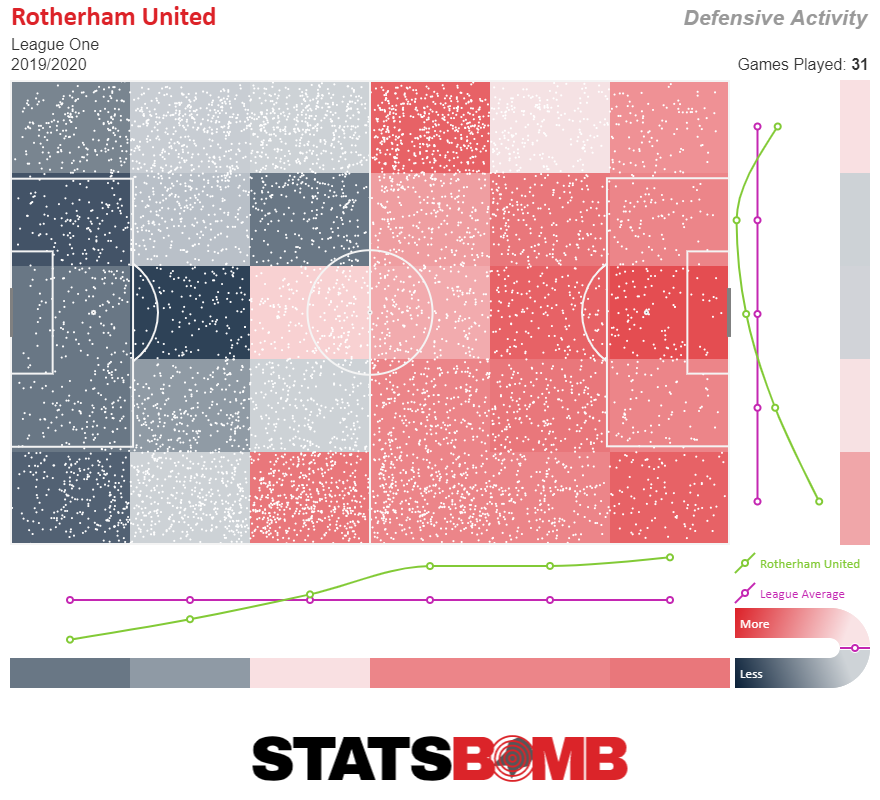 … which just makes them an unpleasant and uncomfortable side to play against: 90 minutes of constant duelling all over the pitch, on the ground and in the air. 28% of the opposition’s passes are pressed aggressively by Rotherham, the highest percentage in League One. As well as making the opposition run a red and white gauntlet, they match this with a, frankly absurd, set piece threat, scoring 21 set piece goals in 31 matches.
… which just makes them an unpleasant and uncomfortable side to play against: 90 minutes of constant duelling all over the pitch, on the ground and in the air. 28% of the opposition’s passes are pressed aggressively by Rotherham, the highest percentage in League One. As well as making the opposition run a red and white gauntlet, they match this with a, frankly absurd, set piece threat, scoring 21 set piece goals in 31 matches. 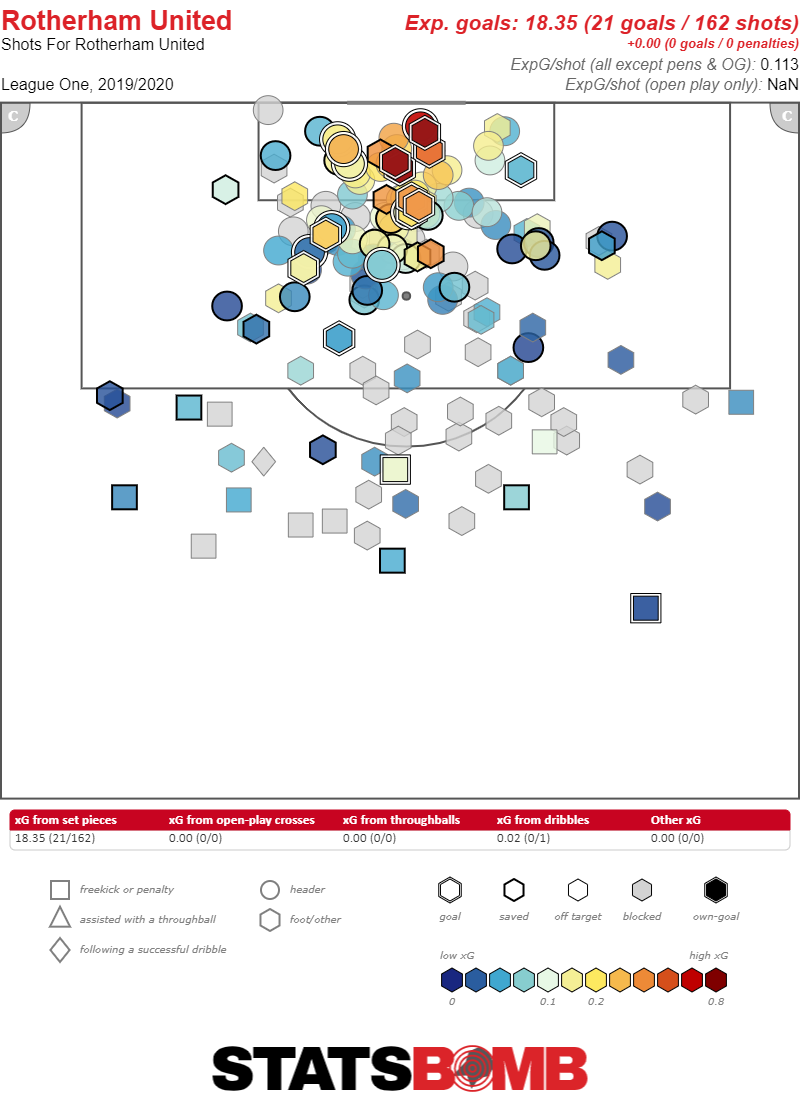 Another note is the fitness levels of the side, owed in large part to Warne’s previous role as a fitness coach. Where the rest of the league may be just starting to flag with the majority of a gruelling season behind them, the Millers may only just be hitting their peak. An ominous sign to their promotion rivals. A strong run has propelled Coventry from play-off hopefuls into the automatic promotion places. Were the Sky Blues to go up this season it would be the culmination of three years of upward trajectory under Mark Robins, after securing a play-off promotion from League Two in 2017-18 and just missing out on a play-off berth in last season’s League One. It’s as commendable as it is surprising that Coventry have managed to hit these heights despite being forced to play their home games at a neutral venue, but equally impressive is that they’re doing so with the 2nd youngest squad on average across the whole division. Their collection of early and mid-peak players has swept aside far more experienced campaigners to get to this position, playing an easy-on-the-eye short passing possession game in the process.
Another note is the fitness levels of the side, owed in large part to Warne’s previous role as a fitness coach. Where the rest of the league may be just starting to flag with the majority of a gruelling season behind them, the Millers may only just be hitting their peak. An ominous sign to their promotion rivals. A strong run has propelled Coventry from play-off hopefuls into the automatic promotion places. Were the Sky Blues to go up this season it would be the culmination of three years of upward trajectory under Mark Robins, after securing a play-off promotion from League Two in 2017-18 and just missing out on a play-off berth in last season’s League One. It’s as commendable as it is surprising that Coventry have managed to hit these heights despite being forced to play their home games at a neutral venue, but equally impressive is that they’re doing so with the 2nd youngest squad on average across the whole division. Their collection of early and mid-peak players has swept aside far more experienced campaigners to get to this position, playing an easy-on-the-eye short passing possession game in the process. 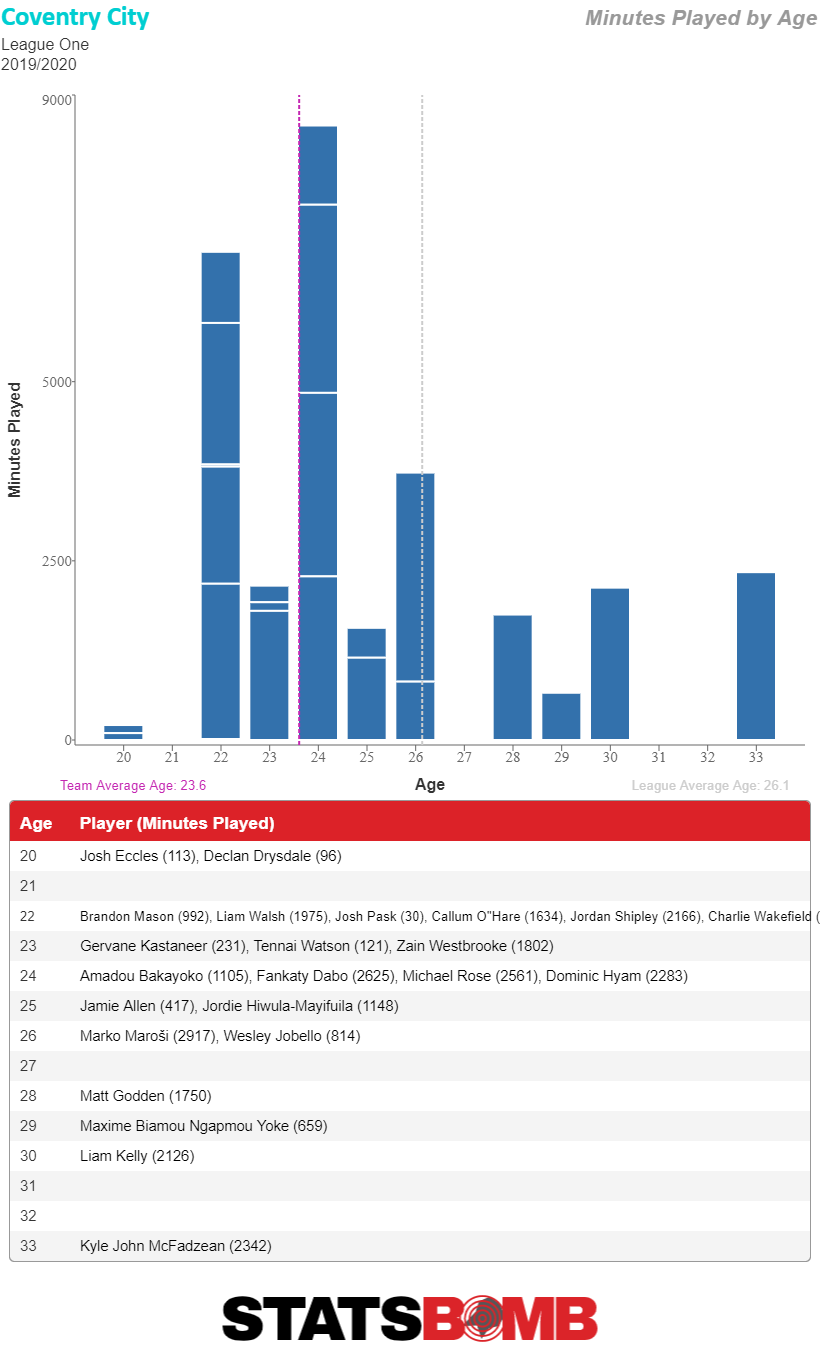 Despite the acclaim for their on-ball work, it’s as much their shape out of possession that has led them to this position, having only been defeated on three occasions this season and conceding the joint-fewest shots per game alongside Rotherham. Wycombe’s unlikely rise to the top of the division in the first half of the season was eye-catching and eyebrow-raising in equal measure. As more fancied outfits stalled around them, the Chairboys stole a march and they remain in contention despite being clawed back into the pack more recently. Part of their unlikely rise was owed in-part to a bit of a statistical freak when they embarked on a run of eight games between October and December in which they conceded just one goal, scored ten and managed to go W6 D2 L0. Seven clean sheets in eight games was some doing and they’d given very few genuine chances away in that time but of their opponents’ 101 shots, just 10 hit the target and just one made it into the net. A 1% conversion rate is rare at any level even in small eight game samples.
Despite the acclaim for their on-ball work, it’s as much their shape out of possession that has led them to this position, having only been defeated on three occasions this season and conceding the joint-fewest shots per game alongside Rotherham. Wycombe’s unlikely rise to the top of the division in the first half of the season was eye-catching and eyebrow-raising in equal measure. As more fancied outfits stalled around them, the Chairboys stole a march and they remain in contention despite being clawed back into the pack more recently. Part of their unlikely rise was owed in-part to a bit of a statistical freak when they embarked on a run of eight games between October and December in which they conceded just one goal, scored ten and managed to go W6 D2 L0. Seven clean sheets in eight games was some doing and they’d given very few genuine chances away in that time but of their opponents’ 101 shots, just 10 hit the target and just one made it into the net. A 1% conversion rate is rare at any level even in small eight game samples. 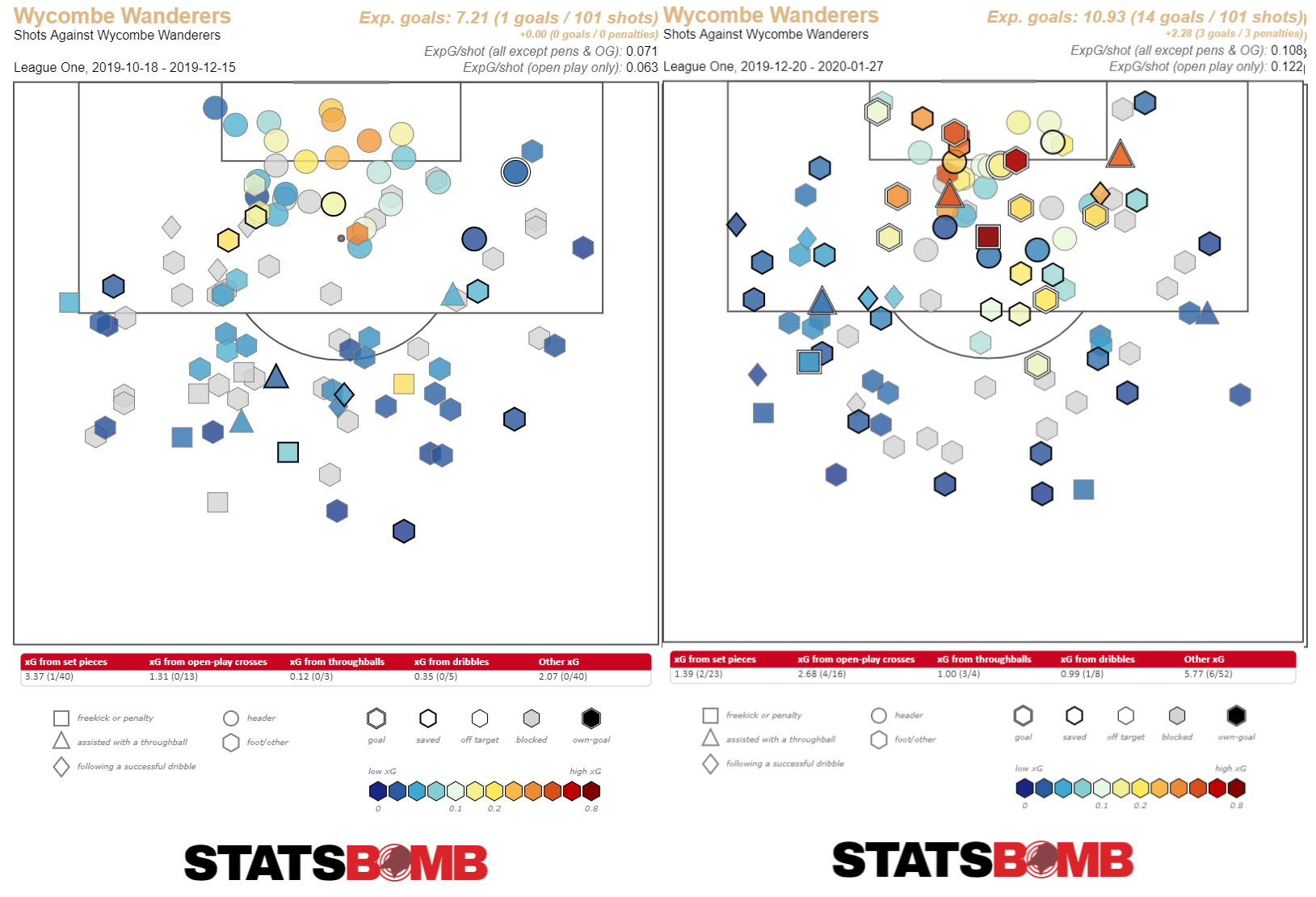 I reiterate that Wycombe defended well in that time but cruelly, as if to ram home the point of how unlikely it was, from their next 101 shots Wycombe conceded 14 goals and their lead at the top was eaten up. Given their position, no one will tell Wycombe not to shoot for the stars and outrun their pre-season expectations by as great a margin as possible from here. As unlikely as it is, we’ve seen unlikely occurrences at Adams Park already this season, so why not another? Next… Sunderland AFC [suhn-der-luh nd] noun
I reiterate that Wycombe defended well in that time but cruelly, as if to ram home the point of how unlikely it was, from their next 101 shots Wycombe conceded 14 goals and their lead at the top was eaten up. Given their position, no one will tell Wycombe not to shoot for the stars and outrun their pre-season expectations by as great a margin as possible from here. As unlikely as it is, we’ve seen unlikely occurrences at Adams Park already this season, so why not another? Next… Sunderland AFC [suhn-der-luh nd] noun
- A football team located in a Tyne and Wear seaport, in North East England.
- A vortex. Defined as that downward swirling motion regularly observed in nature, often during volatile environmental conditions. A vortex is manifested in different forms, such as tornadoes, whirlpools, or a flushing toilet.
I’ll let you decide which of those forms best describes Sunderland’s recent years. Joking aside, it genuinely appears that Sunderland might have found the saviour to kick that downward swirling motion into reverse. The most confounding thing about Phil Parkinson’s impact in turning the team around was that his first milestone as the new manager was to lead them to the lowest league position in their history on Christmas Day 2019 after picking up just eight points in his first eight games, leaving them in the bottom half of the table. Surely the only thing that’d turn the season and get the fans onside would be a run of 30 points from the next 13 games? Thankfully for Parkinson, that’s what he managed to achieve and promotion rivals are now shifting nervously as the Black Cats pick up that all important momentum (and other such proverbials) heading into the final straight. Eight clean sheets in their last nine means Sunderland now have the best defensive record in the league but another piece of good work by Parkinson has been to get Lynden Gooch firing and showing his best form since their relegation. 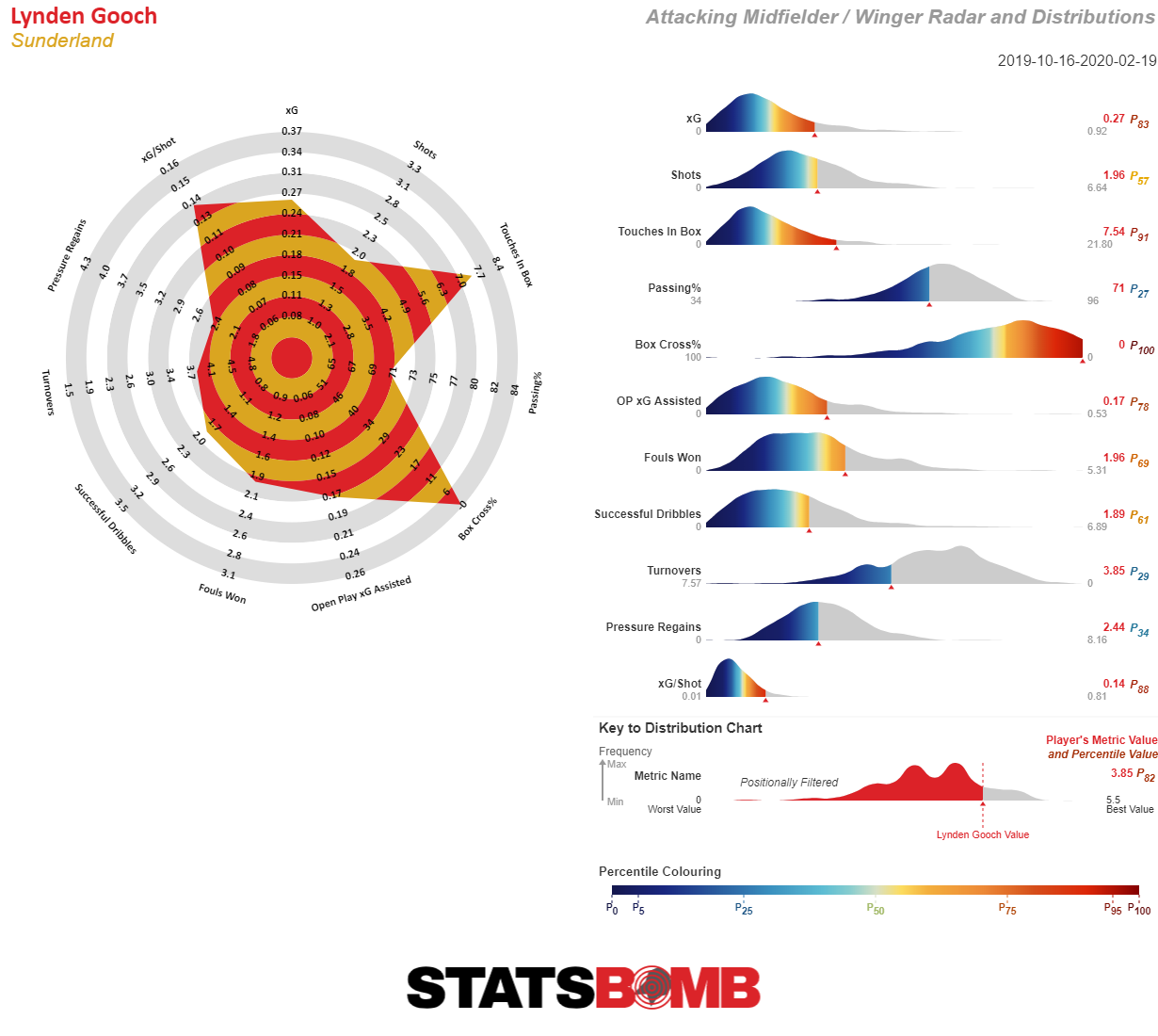 A quick and easy way to summarise Peterborough’s season so far would be to examine their expected goals trendlines.
A quick and easy way to summarise Peterborough’s season so far would be to examine their expected goals trendlines. 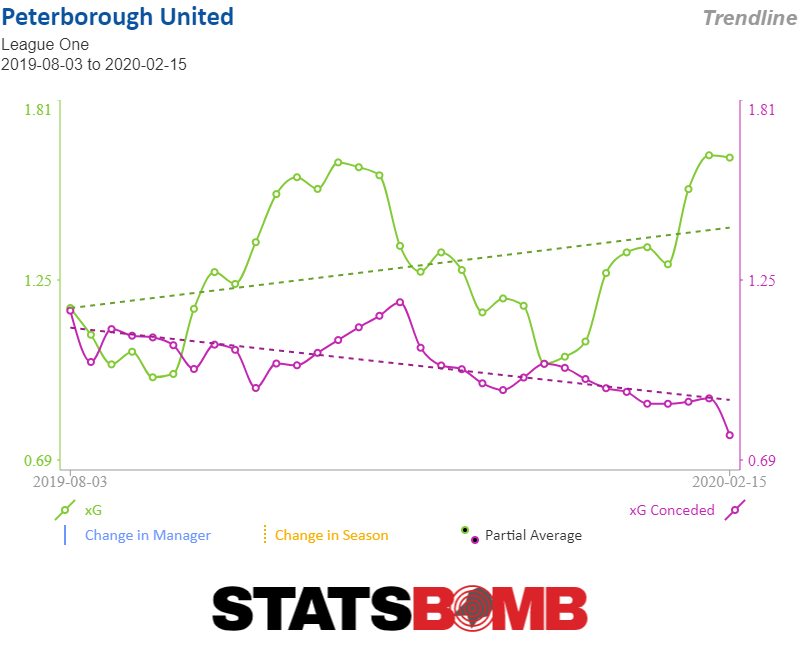 There’s been three strong periods of narrative amongst the fanbase which I’ll annotate below:
There’s been three strong periods of narrative amongst the fanbase which I’ll annotate below:
- Early peak: “Wow, we cannot stop scoring goals! Marcus Maddison, Mo Eisa and Ivan Toney are the Holy Trinity of goalscoring and creativity!”
- Middle trough: “Wow, whatever this is, it is not working. Marcus Maddison sold, Mo Eisa dropped. Please ditch the diamond formation.”
- Late peak: “Wow, we cannot stop scoring goals! Sammy Szmodics, Siriki Dembele and Ivan Toney are the Holy Trinity of goalscoring and creativity!”
In all seriousness, Darren Ferguson gets credit for successfully changing the shape and personnel of the team when it stopped working to keep the promotion aim alive, a major quirk of Peterborough’s season being the difference in the first-choice team being five, if not six, players different to the first choice used during the early season good form. If Peterborough do seal promotion then a lot will be down to the form of Ivan Toney up front, who has made the leap from flashes of potential to simply far too good for this level. The January-acquired support act of Sammy Szmodics has also proven to be a shrewd signing and not just because of his four goals and three assists in his first seven appearances for Posh; his movement in the hole both when Peterborough have and do not have possession has been far more effective to the system than that of predecessor Marcus Maddison. Five wins in a row sees Fleetwood make a timely run into the top six. A recent run of seven draws in nine games threatened to blow their promotion ambitions off course but the evolution in the team since the turn of the year looks to be paying off. More mobility has been added to the backline in Everton loanees Callum Connolly and Lewis Gibson, counterbalanced with the installation of he-of-over-200-Premier-League-appearances Glenn Whelan to central midfield, and the tweaks appear to have taken the Cod Army to a new level. 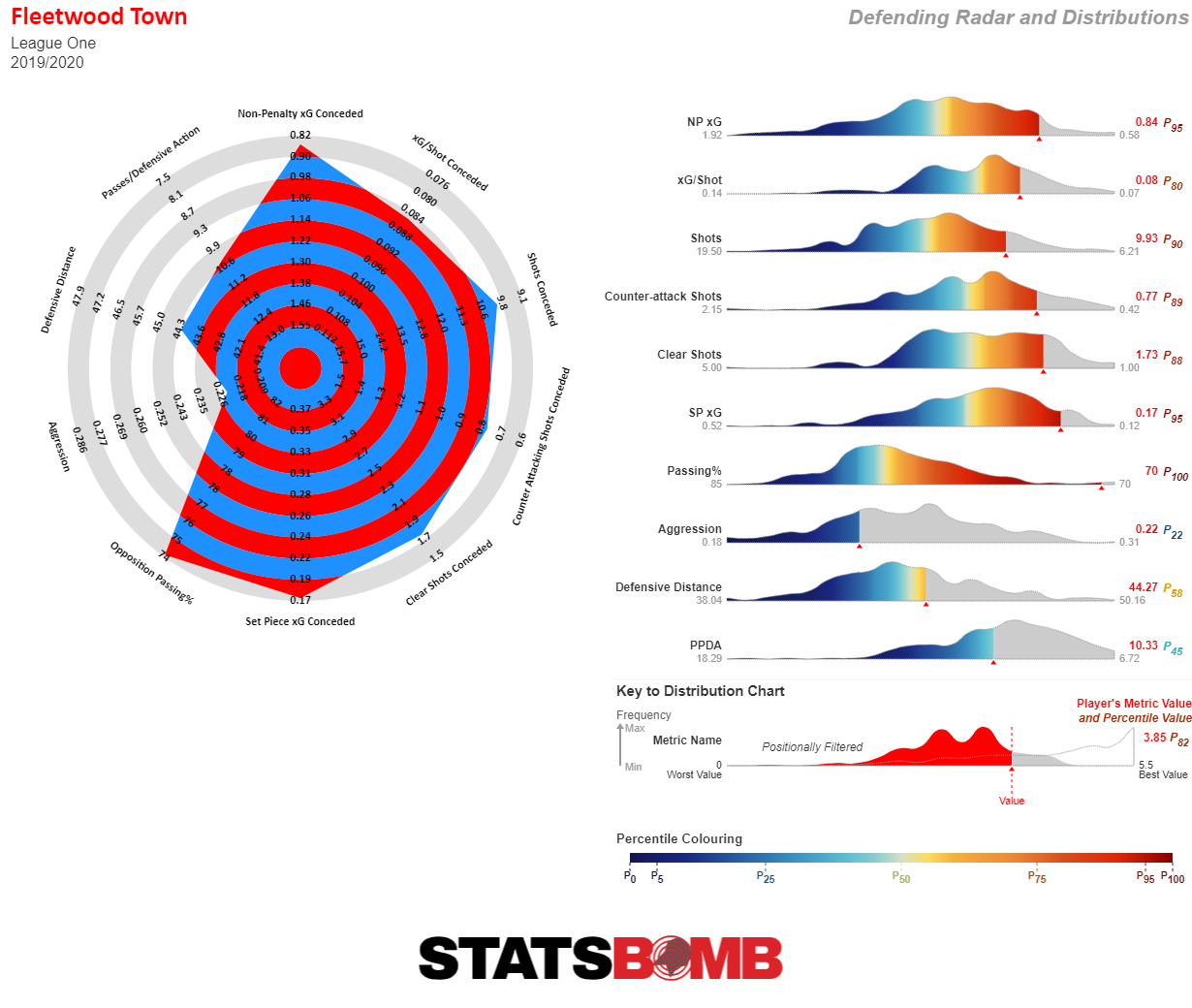 For a team that has spent more time out of the top six than in it this season, the signs, particularly defensively, have always been there in the underlying numbers that they could be capable of ending up there. They give away fewer than 10 shots per game, which are rarely of a clear-cut quality, and give very little away on set plays. A foundation as solid as that could enable Fleetwood to swim upstream, through the busy logjam and into Championship waters. Portsmouth are another resurgent force hitting form at the right time of the season. Falling in last season’s play-offs, Pompey were pre-season favourites to win the league this time around but found themselves as low as 16th in November. The early struggles were a result of the slight flaws in Kenny Jackett’s system being exposed repeatedly. There were numerous games in the early stages where Pompey would have an equal or better part of the game, and either go behind in unlikely circumstances or routinely concede an equaliser having looked to defend any lead they’d gained, when if anything they’d had the better opportunities to extend their lead. They simply couldn’t close a game out. The performances during this run were never as bad as the results they were getting and below highlights the disparity between Portsmouth’s expected goal difference and actual goal difference in the earlier part of the season, with green shade representing an underperformance.
For a team that has spent more time out of the top six than in it this season, the signs, particularly defensively, have always been there in the underlying numbers that they could be capable of ending up there. They give away fewer than 10 shots per game, which are rarely of a clear-cut quality, and give very little away on set plays. A foundation as solid as that could enable Fleetwood to swim upstream, through the busy logjam and into Championship waters. Portsmouth are another resurgent force hitting form at the right time of the season. Falling in last season’s play-offs, Pompey were pre-season favourites to win the league this time around but found themselves as low as 16th in November. The early struggles were a result of the slight flaws in Kenny Jackett’s system being exposed repeatedly. There were numerous games in the early stages where Pompey would have an equal or better part of the game, and either go behind in unlikely circumstances or routinely concede an equaliser having looked to defend any lead they’d gained, when if anything they’d had the better opportunities to extend their lead. They simply couldn’t close a game out. The performances during this run were never as bad as the results they were getting and below highlights the disparity between Portsmouth’s expected goal difference and actual goal difference in the earlier part of the season, with green shade representing an underperformance. 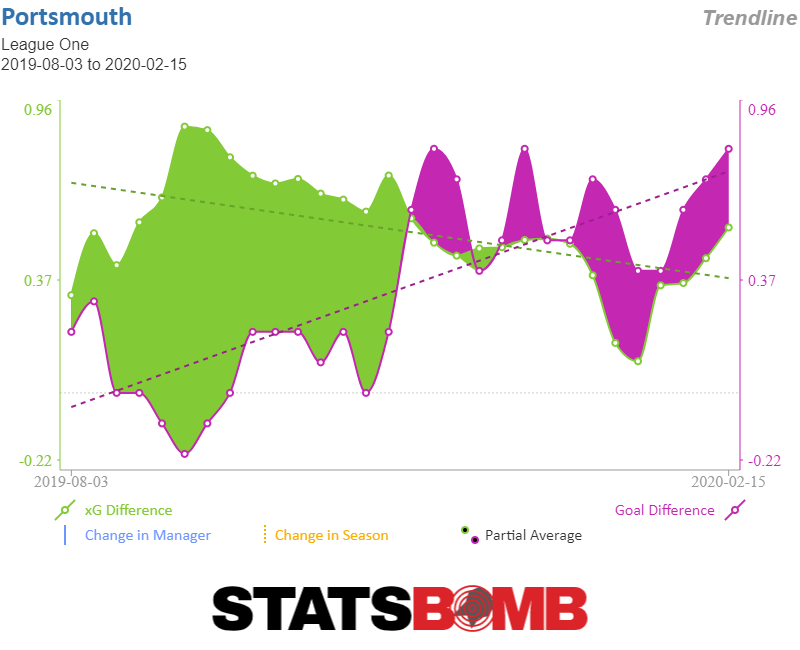 The early struggles prompted Kenny Jackett to rethink the process and the answer he came up with was to shift the team up the pitch, pressing higher and aiming to disrupt the opposition’s build up further away from Portsmouth’s goal. You’ll see below, the average distance away from their own goal that they’re committing defensive actions (in purple) has increased, with the amount of passes the opposition are allowed to complete before a Portsmouth defensive action (in green) has decreased.
The early struggles prompted Kenny Jackett to rethink the process and the answer he came up with was to shift the team up the pitch, pressing higher and aiming to disrupt the opposition’s build up further away from Portsmouth’s goal. You’ll see below, the average distance away from their own goal that they’re committing defensive actions (in purple) has increased, with the amount of passes the opposition are allowed to complete before a Portsmouth defensive action (in green) has decreased. 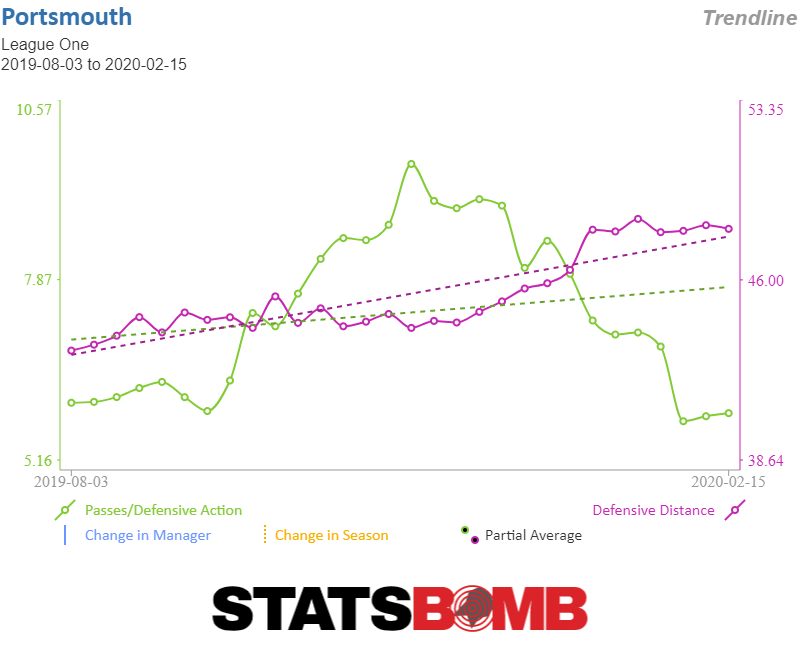 The introduction of the energetic Andy Cannon to the #10 position as well as the January acquisition of Cameron McGeehan has helped to alter the balance of the side in a positive way and hopes of going one further than last season are far from extinguished. When I put it to you that Ipswich have picked up 25 points from their last 22 games you would be perfectly entitled to wonder how they remain in this race. They exploded out of the blocks with 8 wins in their first 11 games but the downward trend in both results and performances has seen them fall flat on their face since. Only a reverse of those trends would see an automatic promotion place become theirs.
The introduction of the energetic Andy Cannon to the #10 position as well as the January acquisition of Cameron McGeehan has helped to alter the balance of the side in a positive way and hopes of going one further than last season are far from extinguished. When I put it to you that Ipswich have picked up 25 points from their last 22 games you would be perfectly entitled to wonder how they remain in this race. They exploded out of the blocks with 8 wins in their first 11 games but the downward trend in both results and performances has seen them fall flat on their face since. Only a reverse of those trends would see an automatic promotion place become theirs. 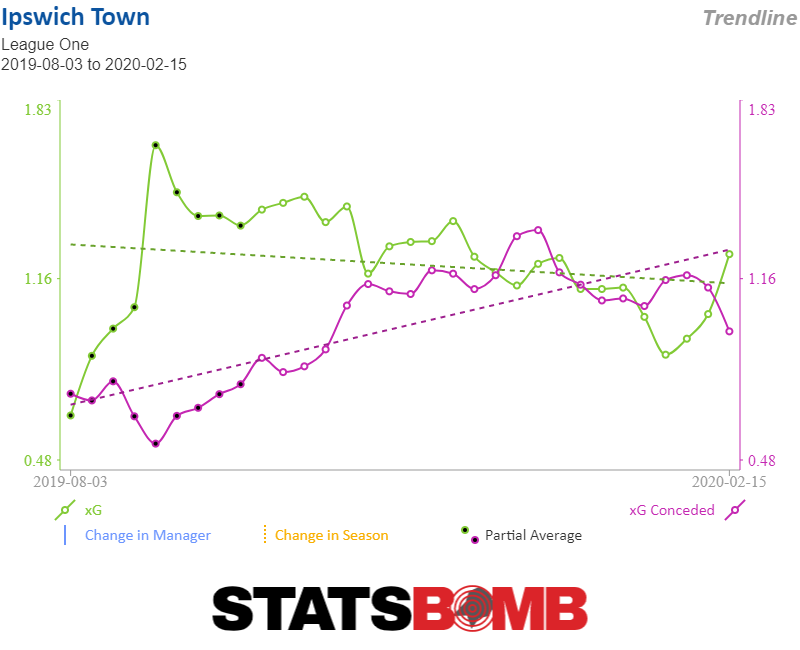 Exactly why their early season results contrast so starkly from runaway title winning standard to bottom-half struggler standard seems to be a cocktail of factors. They were wildly overperforming in the early stages: on-pitch performances were never as good as such a dominant run of results and inevitably results were always going to come back down to earth a bit. Secondly, the long-term injury to flying wing-back Kane Vincent-Young, who gave the team real attacking impetus on the right flank which has so far proven to be irreplaceable. The juggling between teams and systems to try and redress that imbalance is the third factor; the level of rotation and tinkering between personnel and team shape without identifying a solution that works. Fourth is just good old player form. Only Flynn Downes has performed to a consistently good level for Ipswich this season, look across the rest of the side and it’s hard to spot a player that’s made a significant impact on the division, with individuals showing form in bursts but never across a prolonged stretch of games. That said, there’s still 25% of the season in which to fix those issues, but in order to go up Ipswich will have to start doing something we haven’t seen them do for half a season now.
Exactly why their early season results contrast so starkly from runaway title winning standard to bottom-half struggler standard seems to be a cocktail of factors. They were wildly overperforming in the early stages: on-pitch performances were never as good as such a dominant run of results and inevitably results were always going to come back down to earth a bit. Secondly, the long-term injury to flying wing-back Kane Vincent-Young, who gave the team real attacking impetus on the right flank which has so far proven to be irreplaceable. The juggling between teams and systems to try and redress that imbalance is the third factor; the level of rotation and tinkering between personnel and team shape without identifying a solution that works. Fourth is just good old player form. Only Flynn Downes has performed to a consistently good level for Ipswich this season, look across the rest of the side and it’s hard to spot a player that’s made a significant impact on the division, with individuals showing form in bursts but never across a prolonged stretch of games. That said, there’s still 25% of the season in which to fix those issues, but in order to go up Ipswich will have to start doing something we haven’t seen them do for half a season now.